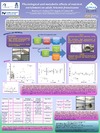Identificador persistente para citar o vincular este elemento:
https://accedacris.ulpgc.es/jspui/handle/10553/11838
| Título: | Physiological and metabolic effects of nutrient enrichment on adult Artemia franciscana | Autores/as: | Martínez, Ico Packard, Theodore T. Segade-Botella, Ángel Gómez, May |
Clasificación UNESCO: | 251092 Acuicultura marina | Palabras clave: | Artemia franciscana Respiration Potential respiration Selco |
Fecha de publicación: | 2014 | Resumen: | Brine shrimp nauplii (Artemia sp.) are used in aquaculture as the major food source for many cultured marine larvae, and also used in the adult phase for many juvenile and adult fish. One artemia species, Artemia franciscana is most commonly preferred, due to the availability of its cysts and to its ease in hatching and biomass production. The problem with A. franciscana is that its nutritional quality is relatively poor in essential fatty acids, so that it is common practice to enrich it with emulsions like SELCO and ORIGO. This “bioencapsulation”, enrichment method permits the incorporation of different kinds of products into the artemia. This brine-shrimp’s non-selective particle-feeding habits, makes it particularly suitable for this enrichment process. The bioencapsulation is done just prior to feeding the artemia to a predator organism. This allows the delivery of different substances, not only for nutrient enrichment, but also for changing pigmentation and administering medicine. This is especially useful in culturing ornamental seahorses and tropical fish in marine aquaria In this study the objectives were to determine, the relative nutrient value of ORIGO and SELCO as well as the optimal exposure to these supplements prior to their use as food-organisms. | URI: | https://accedacris.ulpgc.es/handle/10553/11838 | Fuente: | SImposio Internacional de Ciencias del Mar |
| Colección: | Póster de congreso |
Visitas
60
actualizado el 10-ene-2026
Descargas
26
actualizado el 10-ene-2026
Google ScholarTM
Verifica
Comparte
Exporta metadatos
Este elemento está sujeto a una licencia Licencia Creative Commons

